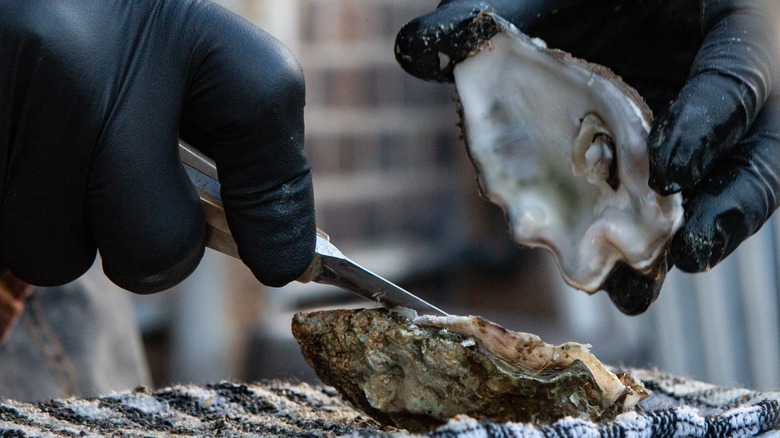Can You Get Sick From Eating Raw Oysters?
Seawater-kissed mollusks that are best known for their slippery texture, oysters have been trending in recent years thanks to interest from Millennials and Gen Z, notes Nation's Restaurant News. But, while their appeal is ever-increasing, prompting oyster bars to surge, it's fair to wonder whether or not you get sick from eating them raw.
Bivalve mollusks from the Ostreidae family, MasterClass explains that edible versions can be found in warm or cool coastal waters and can differ in shape, size, and even flavor depending on the variety and the region where they're harvested. That said, they usually have a sort of salty, briny taste and a plump or springy texture. Enjoyed in all sorts of ways, they can be broiled, steamed, fried, stewed, baked, or even served raw with a side of shallot mignonette.
Super meaty and loaded with protein, Healthline shares that oysters can also provide more than the daily requirement of vitamins and minerals like vitamin B12, copper, zinc, iron, and even omega-3 fatty acids, which can all improve heart and brain health. However, do the benefits outweigh the risks when it comes to eating raw bivalves?
Raw is always risky
Chances are you're more likely to get sick than find a pearl in your next oyster — let us explain. According to the CDC, vibrio bacteria live in coastal waters alongside oysters, who feed by filtering those waters, allowing the bacteria to absorb into their tissue. So when you consume raw oysters, you're more at risk of contracting vibriosis.
Although the FDA explains that common symptoms might be limited to diarrhea and vomiting, in some cases, the vibrio bacteria can cause serious illnesses like blistering of the skin, bloodstream infections, amputations, or even death. In fact, the CDC claims that roughly 80,000 people get sick with vibriosis every year, with an average of 100 casualties.
Generally, oysters with vibrio bacteria won't look, smell or taste any different; however, SFGate suggests avoiding rancid-smelling oysters with damaged shells or have dried or wrinkled meat, as those might lead to other food-borne illnesses. Likewise, while adding alcohol, hot sauce, or lemon juice might be old wives' tales for how to fight against vibrio, LiveStrong confirms that the only real way to avoid risk is by fully cooking oysters. Having second thoughts about joining your friends at the oyster bar, too?

